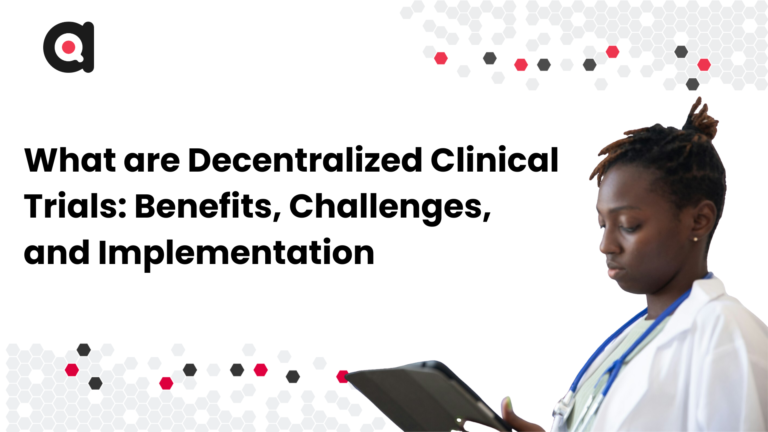What are Decentralized Clinical Trials: Benefits, Challenges, and Implementation
Table of Contents
ToggleAQ

Decentralized clinical trials (DCTs), also known as remote or virtual clinical trials, represent a “modern approach” to conducting clinical research in real-time.
Over the past few years, Decentralized Clinical Trials (DCTs) have transformed from a promising innovation to a pivotal force shaping the landscape of clinical research. The future of clinical trials is undeniably decentralized, as it offers a more inclusive and streamlined approach to advancing medical research.
Let’s explore DCTs, covering their definition, benefits, challenges, and key considerations for successful implementation.
Understanding Decentralized Clinical Trials (DCTs)
Unlike traditional clinical trials that require participants to visit specific clinical sites, DCTs leverage digital technologies to enable remote participation and data collection.
Decentralized Clinical Trials (DCTs) represent a contemporary approach to medical research, leveraging technology to move away from site-centric methodologies. In DCTs, data collection, patient monitoring, and interactions occur remotely. All while reducing geographical barriers and enhancing participant engagement.
The expedited development of COVID-19 vaccines is a practical example of DCTs in 2019. It was facilitated by decentralized elements in clinical trials, leaving a powerful impact of this approach on global health crises.
Telehealth adoption surged to 76% in 2020, showcasing a significant increase from the previous year’s 11%. Similarly, the initiation of approximately 1,300 clinical trials with virtual components was estimated back in 2022, highlighting the continued growth of the decentralized approach in clinical research.
Benefits of Decentralized Clinical Trials
Decentralized Clinical Trials (DCTs) are reshaping clinical research by leveraging technology for a more streamlined and patient-centric approach. They enhance inclusivity, diversify study populations, and expedite timelines by minimizing physical site visits. For sure, the real-world data captured in participants’ everyday lives provides authentic insights into treatment effectiveness.
Here are some of the major benefits of DCTs in clinical research:
Enhanced Participant Experience
Decentralized clinical trials (DCTs) significantly benefit participants by reducing burdens through fewer site visits and providing the flexibility of remote participation. This enhanced participant experience is further amplified with multimedia training and on-demand support, ensuring a user-friendly and accommodating approach to clinical trial engagement.
Improved Compliance and Data Accuracy
The utilization of digital tools in decentralized clinical trials (DCTs) ensures real-time data collection, mitigating the risk of missing or inaccurate entries. Electronic Patient-Reported Outcomes (ePRO) and remote monitoring further contribute to heightened data accuracy, fostering a more reliable and precise clinical trial environment.
Efficiency and Speed
Embracing the decentralized model, clinical trials witness accelerated recruitment and enrollment, often achieving a pace two to four times faster than conventional approaches. This accelerated efficiency owes much to the integration of cloud-based Electronic Data Capture (EDC) systems, streamlining data analysis and propelling trial timelines with remarkable speed.
Increased Access and Diversity
Eliminating geographical barriers, Decentralized Clinical Trials (DCTs) fosters diverse and inclusive participant pool. Targeted digital media strategies effectively reach populations previously unaware of trial opportunities, expanding access and promoting diversity in clinical research.
Cost-Effectiveness
Decentralized clinical trials revolutionize cost structures by shifting from traditional site-based procedures to home-based protocols. This strategic transition not only substantially reduces the expenses associated with data collection but also ensures efficient resource utilization through virtualized site support. The result is a more cost-effective and streamlined approach to clinical trial management.
Challenges of Decentralized Clinical Trials
While decentralized clinical trials offer numerous advantages, they also pose challenges related to data security, regulatory compliance, and the need for robust digital infrastructure. As the field evolves, researchers, regulators, and industry stakeholders actively work to address these challenges and refine best practices for conducting decentralized clinical trials.
Regulatory Hurdles
- Varying regulatory acceptance globally, necessitating careful navigation and engagement with ethics committees.
Systems Integration Challenges
- Difficulty integrating DCT components into traditional trial structures.
- Siloed data systems and potential workflow issues may arise.
Resistance to Change
- Operational teams’ reluctance to transition from traditional methods to DCTs.
- Inertia and fear can impede the smooth adoption of decentralized approaches.
User Accessibility Concerns
- Not all participants may have equal access or comfort with digital tools.
- Considerations for digital literacy, geographic disparities, and socioeconomic factors are essential.
How to Implement Decentralized Clinical Trials Successfully?
The error-free implementation of DCTs not only accelerates medical advancements but also upholds the highest standards of quality and ethical conduct. Here’s how you can do it:
Strategic Planning
Researchers must carefully identify and select the appropriate technology and digital tools required for seamless data collection and effective participant engagement. This initial strategic phase lays the foundation for the entire decentralized trial process.
Regulatory Compliance
The next step is to thoroughly understand and comply with the regulations governing DCTs. Engaging with regulatory bodies and ethics committees is essential to secure the necessary approvals. A proactive approach to regulatory compliance ensures that the trial adheres to ethical standards and legal requirements.
Technology Infrastructure
Investing in advanced digital systems for data management and communication is imperative. Therefore, the next step is to ensure the interoperability of various digital tools used in the trial that promotes seamless integration and efficient functioning of the overall technology framework.
Participant Engagement
Creating a positive and engaging experience for participants is a critical aspect of DCT implementation. It is imperative to develop participant-friendly materials and interfaces to enhance comprehension and cooperation. Providing multimedia training sessions and establishing on-demand support mechanisms for participants engaging remotely fosters a participant-centric approach, contributing to the overall success of the trial.
Data Security and Privacy
Maintaining the highest standards of data security and privacy protection is non-negotiable in DCTs. Rigorous measures must be implemented to safeguard participant information. Researchers must also ensure compliance with data privacy regulations and obtain informed consent explicitly covering digital data collection, instilling confidence in participants regarding the secure handling of their data.
Collaboration and Communication
Clear and effective communication channels are vital among stakeholders in decentralized trials. Establishing protocols for remote collaboration and providing virtual site support contribute to a streamlined and efficient trial process. Effective communication ensures that researchers, healthcare professionals, and participants are well-connected throughout the trial’s duration.
Training and Education
Adequate training is essential for both participants and clinical staff involved in a decentralized trial. Thorough education on the proper use of digital tools helps mitigate potential challenges associated with technology adoption. Addressing any concerns or uncertainties related to technology usage through comprehensive training programs promotes smooth trial operations.
Monitoring and Quality Assurance
Continuous monitoring is a cornerstone of decentralized trials. Implementing remote monitoring strategies enables real-time tracking of data, contributing to the overall quality assurance of the trial. Regular audits ensure data accuracy and maintain the integrity of the trial, instilling confidence in the reliability of the collected data.
Adaptability and Flexibility
Recognizing the dynamic nature of clinical trials, researchers must be prepared for unexpected challenges. Make sure to establish contingency plans for technology failures or disruptions to ensure adaptability and flexibility in the face of unforeseen circumstances. This proactive approach allows for quick resolution and minimizes potential setbacks.
Continuous Improvement
The journey doesn’t end with trial initiation. Collecting feedback from participants and stakeholders provides valuable insights for refinement. Staying informed about evolving technologies and best practices in decentralized trials ensures that the trial remains at the forefront of innovation, maximizing its chances of success.
Final Words
Decentralized Clinical Trials represent a fundamental shift towards a more patient-centric, efficient, and accessible model for conducting clinical research. As the industry grapples with the challenges posed by regulatory landscapes and operational shifts, the benefits of DCTs far outweigh the hurdles.
Related Articles

Industry News
Clinical Trials and the Future
Introduction: Clinical trials have long been the backbone of medical research, playing a vital role in advancing healthcare and bringing innovative treatments to patients. Over the years, these trials have undergone significant transformations, driven by advancements in technology …
AQ

Industry News
Apprehensions of Clinical Trial Management in the Era of Digital Transformation
In recent years, digital transformation has revolutionized various industries, including healthcare. One area greatly impacted by this transformation is clinical trial management. While digital technologies offer numerous benefits to streamline and enhance the clinical trial process …
AQ

